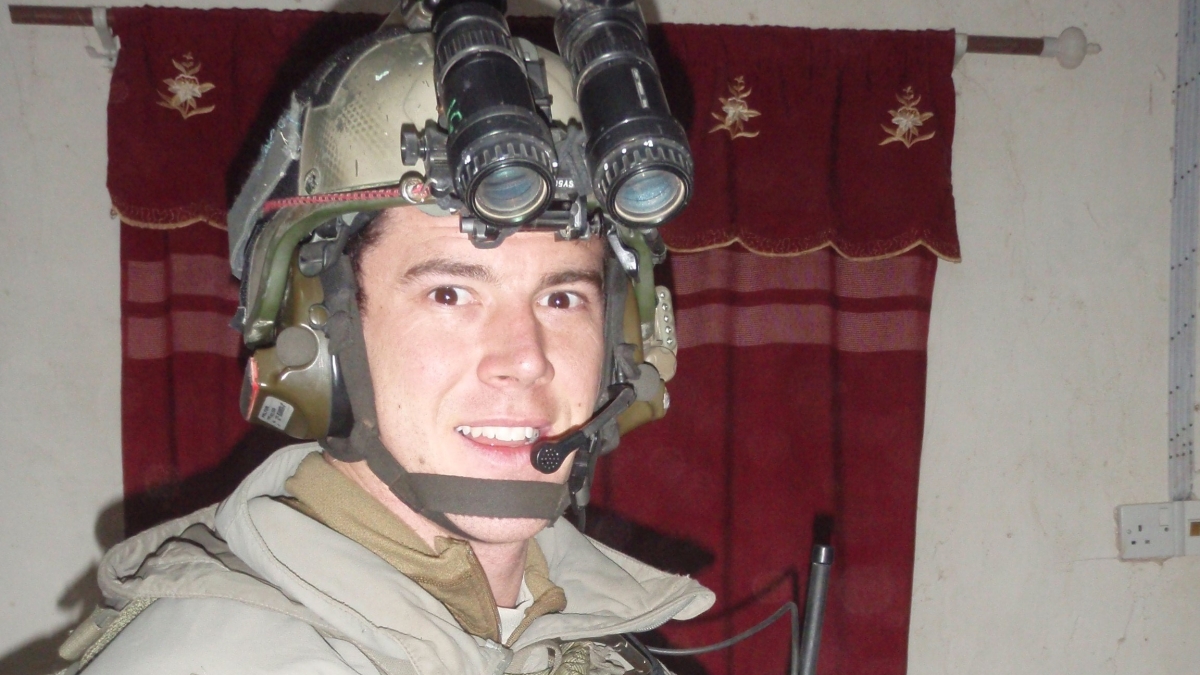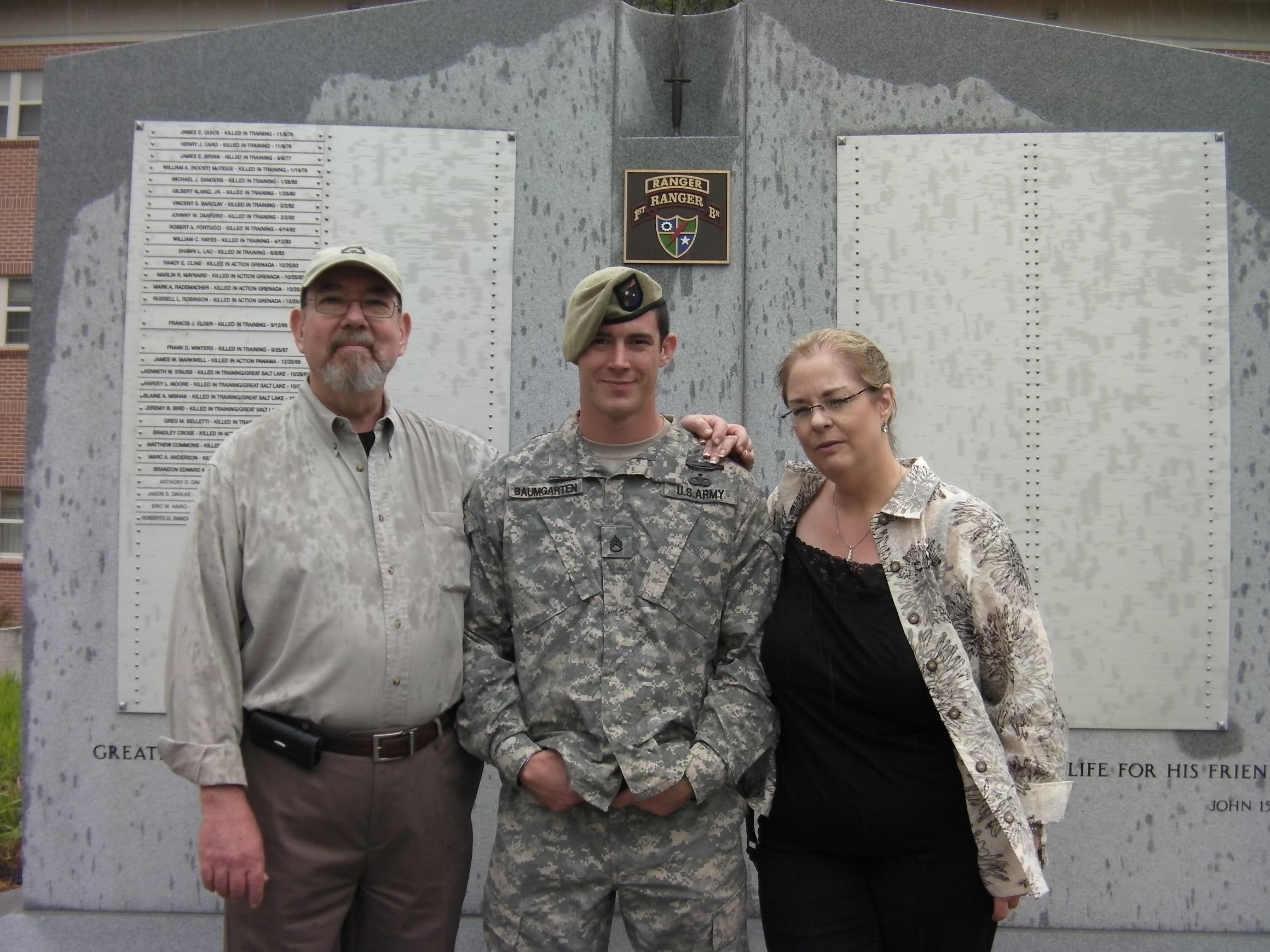Still serving: Army Ranger to anthropologist, veteran PhD student aims to help others

Michael Baumgarten (pictured here in Iraq in 2007) served eight and a half years in the 1st Ranger Battalion of the United States Army. Photo courtesy Michael Baumgarten
Editor's note: This story is part of our Salute to Service coverage, Nov. 1–11. Learn about the schedule of events.
On Sept. 11, 2001, a group of new Army recruits were at basic training in Fort Benning, Georgia, on the rifle range when the drill sergeants started to huddle around. It was obvious they were agitated, and then came the rumors, stories, truths and lockdowns, Michael Baumgarten recalled.
He was a new recruit when terrorists crashed two airplanes into the World Trade Center, a plane into the Pentagon and another plane into a field in western Pennsylvania.
Baumgarten had enlisted in the delayed-entry program for the U.S. Army while still in high school. After basic training, he went to airborne school, then qualified and became a U.S. Army Ranger.
He served eight and half years in the 1st Ranger Battalion. He was deployed to combat 10 times — five to Iraq and five to Afghanistan.
“You learn a lot about human behavior — about your own, about the changes you have as a war ages, and you do too,” said Baumgarten, now a second-year PhD student of cultural anthropology at Arizona State University's School of Human Evolution and Social Change. “You learn about loss, you learn about grief and a really wide range of human emotion from triumph to tragedy. But you do this in a really compressed amount of time.”
He spent his last couple of years in the Army as part of an instructor team for the Navy Seals in San Diego. In 2013, Baumgarten felt a calling outside of the Army and wanted to have other experiences in life. He enrolled in junior college in San Diego.
Baumgarten’s focus from school shifted when he received a call from a friend and Navy SEAL, Ray Mendoza. Mendoza had an idea for a new docuseries and wanted Baumgarten to work with him. The show, “The War Fighters,” aired on the History Channel. Baumgarten shared his personal experiences in the episode “Objective Brenton.”
“I’m really proud of this work,” Baumgarten said. “We interviewed veterans who talked about their experiences with combat and even suicide. We wanted to cover all of these fights and guys losing their friends in places that no one would otherwise read or talk about.”
After a few years of television work, Baumgarten returned to school and finished his bachelor's degree at California State University, Northridge. During his senior year, Baumgarten participated in The Warrior-Scholar Project.
The Warrior-Scholar Project runs boot camps throughout the summer across 25 college campuses in the United States, including Harvard, Cornell and Princeton. The one- and two-week camps are a type of college-preparatory course and offer introductions in humanities, STEM, business and entrepreneurship. This summer, Baumgarten volunteered his time as a fellow in the program. He wants veterans and active-service members to know that everyone belongs in college.
“If there are veterans that are reading this, know that there are programs out there like the Warrior-Scholar Project,” Baumgarten said. “Even if you are currently an undergraduate student at ASU, it's never too late to participate.”
Researching PTSD and suicides in veterans
Michael Baumgarten at Hunter Army Airfield in Savannah, Georgia, with his parents. Photo courtesy Michael Baumgarten
During his undergraduate years, Baumgarten happened to read about the work Sarah Mathew, associate professor at the School of Human Evolution and Social Change, was doing regarding warfare.
“Sarah’s work is the reason why I am here,” Baumgarten said. “What I study is very similar to Mathew’s and a postdoc of her’s, Matt Zefferman, who is also a veteran. They may have done some of the first cross-cultural post-traumatic stress disorder (PTSD) research at her field site in Kenya.”
Mathew is Baumgarten’s advisor. Baumgarten is focusing his research on PTSD and military veteran suicide across all branches of the military.
“Michael is ideally positioned to conduct this study, with his deep personal and professional connections with and commitment to his fellow service members and the wider veteran community,” Mathew said.
“Before coming to grad school, he co-produced a docuseries for the History Channel, 'The Warfighters,' which featured intimate first-person narratives of U.S. Special Forces missions in Iraq and Afghanistan. Getting service members to open up about difficult experiences is not something everyone can do — which is a hurdle for research just as it is for filmmaking.”
Baumgarten wants to build larger data sets about how different groups of people experience and deal with war. And he wants to get additional data behind why Marines are the smallest unit in the military but suffer the most losses from suicide, according to reseach published in 2020.
“I try to look at the military the same way anthropology has looked at pretty much every other group of humans on the planet,” Baumgarten said. “I try to use evolutionary anthropology methods to ask some of these bigger questions about our own evolution within the behavior of war. What role does culture play in this?”
Baumgarten said it’s important to continue to research why the United States' experience of fighting in wars is different compared with other cultures around the world.
“Based on Sarah’s work, there seems to be cultural variability in some PTSD symptoms and suicides,” Baumgarten said. “Turkana are a bit less depressed overall, and they are in this constant state of warfare. So, the U.S. experience is different, right? We’re more depressed, and our wars are fought somewhere else, right? We’re not sitting in Phoenix and worrying about, say, Denver coming to raid us. So now you have this diversity in experience and context.”
Baumgarten welcomes any veterans who would like to talk about his research, experiences or the Warrior-Scholar Project to reach out to him through email.
“I have been quite struck by Michael's humility,” Mathew said. “That level of humility is not cultivated much in the academy. ... The ethos of not drawing attention to oneself, but rather drawing attention to one's team or mission — it seems burned into Michael.”
More University news

Year in review: ASU's top stories for 2024
As the year draws to a close, ASU News is revisiting some of the university's biggest stories in 2024 — from big announcements to…

ASU earns 'Gold' in inaugural Times Higher Education Online Learning Ranking
Arizona State University continues to set the standard in online learning, having earned a Gold rating in the inaugural Times…
2024 President's Awards honor ASU projects for real-world impact
Ten Arizona State University programs were honored for their real-world solutions during the annual President’s Awards ceremony…
